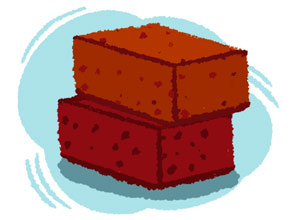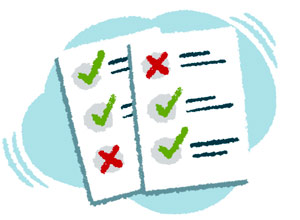
How to Begin to Heal From Trauma
At the end of the day, you can’t control what happened to you—the only thing you can control is how you move forward. And make no mistake: Healing from trauma is hard, and it can be a long road.
But you’re worth it. Your family and kids and community are worth it. So, here’s how to start healing from trauma:

1. Examine the bricks in your backpack.
Remember the bricks in the backpack analogy? It’s time to take a long, hard look at all the bricks and pebbles in your backpack and decide what to do with them.
Here’s the deal: Over time, the bricks we carry become stories we believe about ourselves. We wrap our identity around the things that have been done to us. For example, you might have been sexually traumatized as a kid, and over time, you start to believe the story that you’re damaged goods.
Now, this next part takes courage, but I know you can do it. Write down every negative story you believe about yourself. Carry a journal with you, and when a story pops up, write it down. Every pebble. Every brick. Every story you’ve told yourself about what kind of person you are. And every story others have told you—both positive and negative. You won’t be able to think of them all at once, so be prepared to revisit this process as different things come up.

2. Demand evidence from the stories.
Next, take a look at those stories that have become part of your identity over the years: I’m a bad mom. I’m not attractive. I’m unlovable. Then demand evidence by asking these two questions:
1. Are they true?
2. How does my body respond to them?
And as you write the stories down, I want you to take special note of where they show up in your body. Headaches? Tight neck? A sick stomach? A strong impulse to run? Where are these stories activating your body?
And ask yourself if they’re factually correct. Are you indeed unlovable? Unable to hold down a job? Or a disgusting jerk? Maybe the stories are true. Maybe you haven’t been reliable at work or you’ve been a jerk before.
We can’t deny what’s happened to us or what we’ve done, but we don’t have to keep carrying these things around as part of who we are. You have to decide that you are not your trauma, and that it’s time to set those bricks down.
Say out loud, “I’m setting this down!” even if you feel silly doing it. Then say out loud or write down what you need—only you know what that is. It could be time alone, time in counseling, a new job, a chance to reconnect with family, etc. Write down what you believe will help you heal.

3. Write (and live) new stories.
When you set down those stories you’ve been carrying around, you’ve got to replace them with new ones. The good news is, you can control your thoughts. Learning to focus your thoughts and tell yourself new stories takes time, intentionality and practice—but just like physical fitness, you can get better at it over time. You can’t walk into a CrossFit gym today and do 75 pull-ups, but you can get stronger over time with focused effort.
So, anytime you feel yourself start to replay those untrue stories, say, Nope! And direct your thoughts to your new stories. Tell yourself, I’m a good mom, and I love my kids. Or Maybe I’m not perfect, but I’m growing in my marriage. Write these stories down and practice actions that move you closer to becoming the person you want to be.

4. Find community.
You and I were made for community. Human connection has the power to restore us. In fact, true healing can only happen with other people. Seek out connection on purpose, whether that’s through a recovery group, friends, church, school, family or anywhere else where you can talk with kind, supportive people and build genuine relationships.
At the same time, you need to know that you are in control of your story. You get to decide who knows it, how much they know, and when they know it. You control the narrative, so keep in mind that you don’t have to share anything you’re not comfortable talking about.

5. Work with a professional.
Finding a qualified professional who can teach you how to feel safe in your body and in your relationships is one of the most important steps you can take. I highly recommend finding a therapist who can help you unpack trauma and heal.
And depending on your situation, you might even want to find a reputable therapist who specializes in trauma. They can assess the type and severity of your trauma and also walk you through treatments, like Eye Movement Desensitization and Reprocessing (EMDR), Brainspotting, or Trauma-Focused Cognitive Behavioral Therapy (TF-CBT) that help you process what happened and move forward in a healthy way.
If you don’t know where to start, check out BetterHelp—an online approach to affordable, licensed therapy. Go to betterhelp.com/Delony to get 10% off your first month.
Start reading my new book.
Start reading the first chapter of my book Own Your Past, Change Your Future: A Not-So-Complicated Approach to Relationships, Mental Health & Wellness for free to get on the path to being well.


